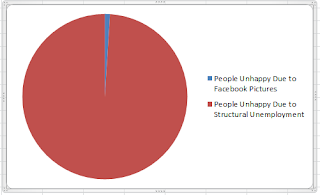This is Sam. He or she is a Gen Y kid/adult. And he/she is unhappy. Why? Well turns out in a market economy, you kind of need money to survive and do anything. So Sam is gonna get a job now:
Yeah, it turns out, unless you know people who are willing to spring you some cash or who can recommend you to other people to spring you some cash, you probably aren't going to get any money to do start-up things. Because in the real world, banks and investors don't throw cash at random college grads. So Sam is pretty hungry at this point so decides to do what he or she is biologically programmed to do: go ask his or her parents for food and board until one of those magical job trees grow next door.
All the while, Sam feels guilty because now his/her parents retirement money is being dwindled away, Sam is not living the independent lifestyle he or she had hoped for/been promised, and some asshole on a website is telling him/her that it is his/her own fault for not being a hard enough worker that all this is happening.
So to recap:
So to recap:
Also, in case other people didn't realize, generational name calling is some really vile bullshit, but it is also incredibly unoriginal. Let's look at how the "Greatest Generation" felt about the baby-boomers:
Around 1995, suddenly the kids who had gone through college in the 80s were terrible wastes of space who were just stealing our precious oxygen and water while not contributing to society enough. A "Slacker Generation" if you will.
Why does this keep happening? Well a quick look at the unemployment rate for 20-25 year olds over the past few decades gives a good clue:
Why does this keep happening? Well a quick look at the unemployment rate for 20-25 year olds over the past few decades gives a good clue:
Yeah it turns out during the formative young adult years of those generations, there were economic issues and many of them (greater than 10%) could not find jobs. Granted usually the reason they could not find jobs were due to the fact major economic shifts were occurring during those time periods, but hey structural economic shifts are hard to explain to the public and no one wants to read that unless you are writing for... The Economist or Financial Times. So, what does a lazy journalist or editor do for social commentary regarding the mass unemployment of those years? Blame the stupid kids for being lazy.








